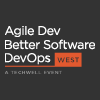Agile Dev, Better Software & DevOps Conference West 2017

PRESENTATIONS
|
DevOps in an Embedded and Regulated Environment
Working in embedded environments greatly restricts the tools available for a DevOps pipeline. A regulated environment changes the processes a development team can use to deliver software. This combination results in a highly restricted environment that forces the team back to first... |
|
|
DevOps: The Key to Quality-Driven Development
Rapidly evolving business demands and competitive environments pose challenges to increase the speed of delivery and do better with less. This often results in sacrificing quality and failing to understand that a minimum viable product must be “viable” to the customer. When organizations... |

Gajan Pathmanathan |
|
Drive Product Improvements with Telemetry
Do you want to know how real users are interacting with your product? Do you want to know which features they don’t use? Would you like to understand how your product works internally under real operational conditions? Then you need telemetry—the instrumentation of your product to record... |
Ken Johnston |
|
Experience Agile Emergence through Sketch Comedy
“The best architectures, requirements, and designs emerge from self-organizing teams.” Most people read this principle from the Agile Manifesto and focus on the self-organization element. What about the concept of emergence? Exactly how do requirements and designs emerge? And how do... |

John Krewson |
|
Finding Efficiencies in Your Development Lifecycle
Many of us feel like we never have enough time to complete everything we want in a given sprint, cycle, or phase. Even though we can't add more hours to our day, we can add time by removing inefficiencies in our development lifecycle management approach. Melissa Tondi explores a number of... |

Melissa Tondi |
|
Finding the 'Seams': Making User Stories Smaller
When we adopt agile practices and a lean mindset, we make great promises to ourselves but we often encounter difficulties in creating user stories that are of high quality and utility. Mitch Goldstein describes why user stories and their value are the currency of agile and lean software... |

Mitch Goldstein |
|
Five XP Practices for Agile Development
Five development practices compose the core of Extreme Programming (XP)—automating the build for continuously integrating software as it is written, collaborating with team members through pair programming, practicing agile design skills that enable testability, using test first... |
David Bernstein |
|
From Monoliths to Services: Paying Your Technical Debt
Ever since distributed software became popular, developers have been choosing whether to use monolithic architectures or service-oriented architectures. With the advancement of cloud infrastructure and the widespread implementation of agile methodologies, the latter approach has been... |

David Litvak |
|
Guiding Cultural Adoption of Agile at Scale
Many approaches to implementing agile focus primarily on the adoption of common practices at the team level. While this focus on practices is important, recognizing that agile is a set of overarching values and principles is also important. Adopting agile “at scale” in organizations often... |

Ebenezer Ikonne |
|
Happy and Productive Teams: A Divine Saga
Matti Klasson believes we live in a world where our social networks and relations are becoming more important in everything we do—and this is reflected in our work environment. Social relations and networks within the organization will supersede traditional hierarchical structures. |

Matti Klasson |


